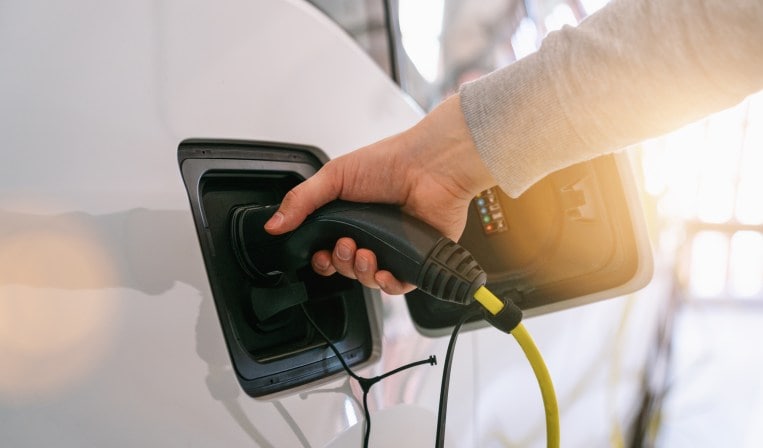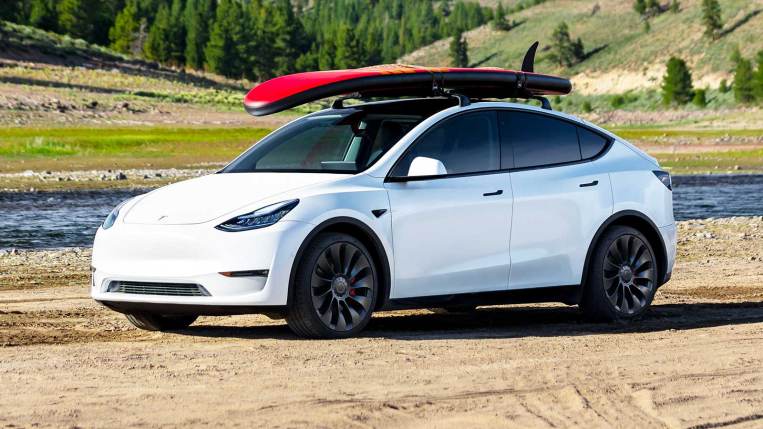[ad_1]

There’s more to owning an electric vehicle (EV) than just skipping trips to the gas station. There are many factors to consider, from operating costs (which can be lower) to insurance (which can be higher).
Are Electric Cars More Expensive to Insure?
In addition to not requiring fuel, electric cars avoid oil changes, are generally easier on the brakes, and have fewer moving parts to break. On the other hand, electric vehicles cost more to buy than their internal-combustion counterparts and, as a result, may cost more to insure.
According to Progressive, a report says, “Generally, higher-priced vehicles cost more to insure because they also cost more to repair or replace. Today’s electric vehicles also have fewer moving parts than conventional automobiles, but those parts can be pricey. If the battery pack is damaged, certain safety protocols are often necessary, adding more to the repair bill.”
The report adds, “There aren’t as many shops with technicians trained to fix electric vehicles versus traditional vehicles. That means those qualified facilities may charge more for repairs because of the specialized training required.”
As with any car insurance premium, your rate is affected by your age, location, and driving record. Keeping a clean driving record with no traffic tickets or accidents will help keep your car insurance premium low.
Is it More Expensive to Insure a Tesla?

According to Jason Wrather, an assistant vice president for Grange Insurance, “Two factors go into calculating insurance rates — how you drive and what you drive.” A customer driving a Tesla Model X, which starts around $115,000, will likely pay more than they would for a gas-powered vehicle.
“In that case, the customer’s insurance rate could be higher since the cost to repair that electric vehicle, if it is involved in an accident, is typically more,” he said. “But make no mistake. Most automakers are now making electric vehicles at a more affordable price point, which means that the insurance rate for an electric vehicle may not be higher.”
Is There Any Special Insurance Required for Electric Cars?
No. Electric car insurance policies look similar to those written for conventional vehicles. You need coverage for liability in case of an accident, as required by state law, and you probably will want to add collision, theft, and uninsured-motorist coverage. Comprehensive insurance covers damage to your vehicle when it’s not in a crash but is rather affected by events out of your control. Examples include extreme weather, a rodent chewing car wires, and more.
There are many levels of insurance coverage available, so it’s best to talk to your agent before you buy or lease a vehicle. Since electric cars tend to cost more, they cost more to insure. EVs also cost more to replace if you get into a car accident and it’s your fault, and the car gets totaled by the insurer. You may want to shop for electric vehicles in different price classes to understand what you will pay for insurance.
Is Special Insurance Required for Hybrid Cars?
According to State Farm Insurance, hybrid cars do not require special insurance.
A spokesperson for the insurer says, “For State Farm customers, there is no difference in insuring an electric or hybrid car compared to insuring a gasoline-powered one. We use the same underwriting guidelines.”
If I Own an EV, Will I Need Extra Homeowner’s Insurance?
If you use a Level 2 home charger in your garage, carport, or anywhere else, these use a plug similar to dryers or electric ranges. You will not need any additional coverage on your homeowner’s insurance policy.
According to State Farm, “There is no need for additional coverage because of a high-voltage charger in the home.”
However, some underwriters may require photographs or documentation that the home-charging unit has been properly and professionally installed.
Does Owning an Electric Car Increase My Insurance Risk?
Every electric car on the market today must comply with federal safety standards, and insurance companies have not identified specific liability risks for electric vehicles. Electric vehicles that meet the National Highway Traffic Safety Administration’s (NHTSA) top 5-Star vehicle safety ratings include the 2022 Tesla Model 3 and 2022 Model Y.
As long as the electric car performs well in crash tests, liability coverage should remain competitive with similarly priced gasoline-powered vehicles.
MORE: Find a Best Electric Car
What Else Should I Consider When Insuring an Electric Car?
Like other vehicles, when insuring an electric car, ask your insurer about savings for any safety technology on board. Many electric cars come with radar sensors, collision avoidance, and automatic braking like conventional gasoline-powered vehicles.
Insurers offer other ways to save, including accident forgiveness, multi-vehicle discounts, vehicle telematics discounts, etc.
RELATED STORIES: How to Buy Car Insurance: Everything You Need to Know
What is the Downside to Owning Electric Cars?
While there are many upsides to owning an electric vehicle, including no gas costs and less environmental impact, the biggest downside comes when you need it repaired, including from vehicle crash damage.
Your insurance carrier may provide recommendations for vehicle repairs. However, consider it best to take your electric car back to the dealer.
Factory-authorized repairs are more important because of the electric car’s unique drivetrain. Beyond crash damage, a big concern is if the battery pack becomes compromised.
Because of these considerations, collision coverage on some EVs may be higher than gas-powered cars. That’s why it’s essential to shop around for car insurance and compare rates for collision coverage before buying an electric vehicle.
Related Stories:
[ad_2]
Source link
